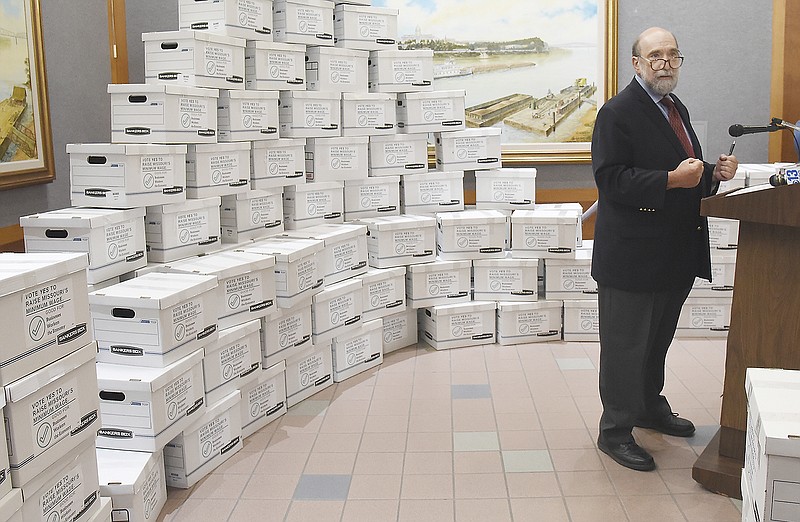A group of business owners, activists and retail employees turned in more than 120,000 signatures Wednesday to the office of Missouri Secretary of State Jay Ashcroft in an attempt to force voters to decide whether to raise the state's minimum wage to $12 per hour.
Proponents of the initiative said Wednesday that the proposal has the support of more than 200 businesses statewide. If passed by voters, the proposal could raise the state's minimum wage gradually until 2023.
Raise Up Missouri, a coalition of businesses, employees and initiative supporters, is leading the campaign. Raise Up Missouri campaign manager Carl Walz said wages have not kept up with the cost of basic necessities.
"People across the state are working full time and are struggling to provide for their families, and they are living in poverty," Walz said.
Missouri's minimum wage is $7.85 per hour for 2018 and is tied to the Consumer Price Index. Over the past five years, it's risen just 50 cents from $7.35 in 2013.
Tipped employees must make at least $3.93 per hour. All businesses are required to pay minimum wage except retail and service businesses with revenues less than $500,000, according to the Missouri Department of Labor.
If approved by voters, the plan laid out in the initiative petition would raise the state's minimum wage from $7.85 per hour to $8.60 per hour beginning Jan. 1, 2019. Missouri's minimum wage then would be raised 85 cents each year thereafter until 2023, when it would hit $12 per hour.
Raise Up Missouri and Missouri Business for a Fair Minimum Wage, a separate group of business owners who support the initiative, turned in the signatures to Ashcroft's office Wednesday. To qualify for the ballot, initiative petitions seeking to amend state statutes need to gather signatures from 5 percent of the gubernatorial vote totals in two-thirds of Missouri's eight congressional districts. For the 2018 general election, that equals about 100,000 signatures statewide.
Tony Wyche, Raise Up Missouri communications manager, said the campaign hopes the question will appear in front of voters on November's general election ballot.
People earning minimum wage make about $314 per week, or $16,000 per year, according to a news release issued by the group. Raise Up Missouri Treasurer Lew Prince, who founded St. Louis record store Vintage Vinyl, said $16,000 is unsustainable for people to live on.
"Thousands of Missourians who put in an honest day's work barely get by, and that's just not right," Prince said. "No one who works full time should have to choose between food and medicine."
Raising the state's minimum wage would result in an increase of $1 billion in consumer buying power by 2023, according to the left-leaning Economic Policy Institute. Organizers said this growth in buying power mostly will come among low-wage families.
Prince said increasing the minimum wage would mean business owners would make an investment in their communities that would benefit cities and towns in the long run. It also would help low-wage earners get off government welfare programs like the Supplemental Nutrition Assistance Program, Prince said.
"That billion dollars will get funneled directly into Missouri businesses and increase demand so those businesses can hire more workers," Prince said.
Scott Sandler, owner of Pizza Head in St. Louis, said he pays his tipped employees around $9 per hour plus tips. Usually his employees earn about $22 per hour including tips. Sandler said this leads to far less turnover than other restaurants see.
The restaurant and hospitality industries had turnover rates of 72.9 percent in 2016, according to the National Restaurant Association. Sandler said his business sees turnover of about 30 percent.
"If you pay today's bare minimum of $7.85 per hour to your employees, why should you expect more than just the bare minimum from them?" Sandler said. "You're telling them you don't value them."

